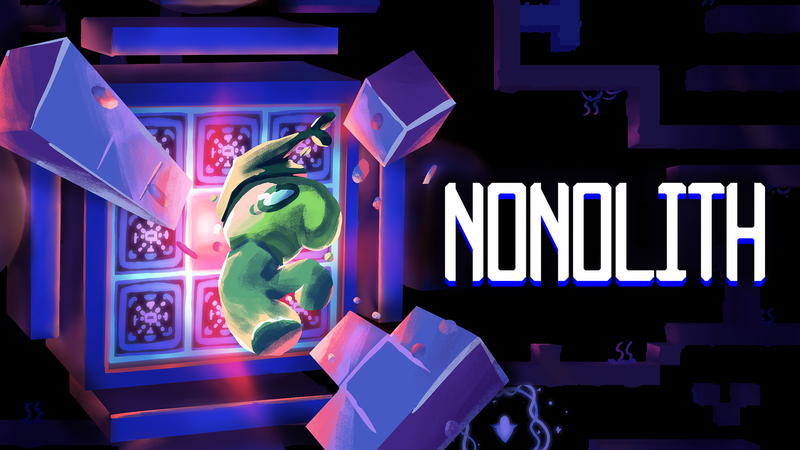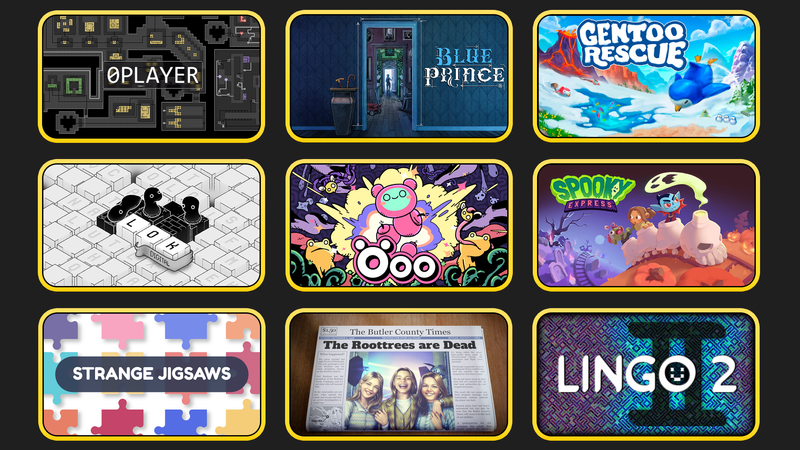I came to the gorgeously illustrated puzzle game Wilderplace with immediate interest: the visual style and the minimal board, reminiscent of a compact roguelike, called to mind some of my favorite games. I was eager to find out what this unique package contained.
It took me quite a while to write this review, partly because I ended up with very complicated, conflicted feelings about Wilderplace as I played it, took breaks from it, and went back to it over time. I wish it was as simple as proclaiming that the gameplay, structure and ideas found within are as unique and engaging as the aesthetic. “The way a game looks and feels versus how it plays and the mechanical ideas it contains” has sort of become a running theme of my reviews for Thinky Games, and in different cases I've arrived at some different conclusions, or looked at this messy dissection from different angles. My experience with Wilderplace continued this trend and brought new insight.
In Wilderplace you play a Shaman, making your way through the Divine Garden populated by many curious characters and animals. Mischievous nature spirits have been causing trouble in the garden, plaguing beast and man alike. Using your magic, you need to pull these troublemakers from their hosts and return them to nature: they'll become trees or rocks or other natural entities, depending on their type. When you pick up a spirit, you then have a few moves before they turn you into an object, meaning you have to find somewhere nearby to deposit them. Placing down these obstacles then changes the level layout — if there are more spirits you need to reach, you have to make sure you're not cutting yourself off. Some restrictions on where these spirits can be placed and additional abilities you eventually unlock all contribute to some nice tricky dilemmas.
It's hard to overstate the beauty and minimal elegance of Wilderplace's illustrated aesthetic. It feels like every hand-drawn line is carefully placed, and the limited palette of colors is cohesive and appealing. The style lends a mystery and mysticism to the world, an ambience that drew me in. Even the fonts are gorgeous, hand-lettered and fitting seamlessly into the world, an area where the aesthetic aspirations of many indie games fall short. The audio is unique as well: a soft, minimal synth soundscape with lots of little motifs that ease in and fade away as puzzle elements are introduced. The world of Wilderplace feels like Adventure Time by way of a minimalist tattoo artist — whimsical and magical, yet restrained and elemental.
Unfortunately, interacting with the game systems of Wilderplace immediately introduces friction to this gorgeous scene. The game takes place on an isometric grid, where the tiles are rotated 45 degrees. WESD is used in place of WASD, but it takes some time to internalize which key will take you in which direction. Using a gamepad or the mouse controls is better, but it feels odd using a mouse for a puzzle game where I'm moving a character around a grid, awkwardly clicking and dragging. At times the rotated, minimal grid gets in the way of thinking through puzzles — characters and puzzle elements are drawn in a wide range of shapes and sizes, and it's not always super intuitive how everything lines up. I often found myself mentally twisting the level 45 degrees to get it back to a square grid, just so that I could plan my moves more easily. While I appreciate how the levels look, and the aesthetic desire to not represent them as boring square boxes, I feel the gameplay and “friction” considerations could've been taken more seriously here.
Unlockable abilities are another fun part of the world and theming of Wilderplace: they're presented in the form of magical items that your character finds and equips, RPG-style, rather than just a new action the player can do. I think it works in harmony with the setting, and it feels like an area where more puzzle games could make an effort: give me at least a little bit of thematically “explaining” why I can do all these things. I don't just “have the option” of moving a tree from one place to another — my magic “Unfathomable Pouch” I found allows me to turn them back into spirits if they're in my way. That's fun, and gaining these items over time does feel like a character progressively growing more powerful.
The writing of Wilderplace further compliments the whimsy and character of the world, understated and playful rather than overbearing or self-serious. The dialogue of the prankster spirits made me laugh a few times: one of them quips “just call it a forest” after another character repeatedly refers to the setting as “the Garden.” The writing also aids the otherworldly fantasy elements: the Unfathomable Pouch has a “rhythmic breeze” going in and out of it, “as though it's inhaling and exhaling.”
Wilderplace wants you to figure things out. Many mechanics are not explicitly explained and you need to come to understand them at your own pace. It did take me a while to learn to predict the patterns of some characters and creatures, but in general I consider this to be a huge positive, a game that lets me think for myself. Too many games these days eagerly shout their solutions and hints at the player, unwilling to risk anyone becoming frustrated at any point. Sanding off the rough, interesting edges of games this way results in lots of smooth, samey, unengaging experiences, and I was glad Wilderplace allowed me the space for contemplation.
Early on in Wilderplace you gain the ability to undo your moves up to three times... but that's as far back as you can ever go. This was the root of one of my biggest issues with the game. I think it's very possible for this kind of restriction to be used to good effect (see the wonderful web-game Tres Undos for an example of “undos as an interesting mechanic”) but there are reasons that it's become a pretty standard convention in logic-based puzzle games to not limit the player in this way. Especially in an occasionally-cryptic game like Wilderplace, we need the freedom to experiment, to go down paths of reasoning and see for ourselves why they don't work, then back out and try something new. This constraint, with no clear intention behind it, comes across as arbitrary in the same way as the archaic and outdated “3 lives before Game Over” design trope which stuck around long after games had evolved past being quarter-greedy arcade machines.
In some long or complicated puzzles, this limitation was almost enough to make me want to stop playing Wilderplace altogether. I'd have slowly solved 80% of a puzzle and then realize that I needed to rethink when/where I was picking up this last spirit. So I hit the undo button to go back a few times… but I've moved too many spaces, and can't actually go back far enough to make any meaningful change to my course of actions. Now my only option is to restart the level, so even if I'm certain that I've solved most of it correctly, I have to go through the motions again. At best this means slogging through a couple minutes of repetitive play, and at worst I don't remember exactly what I did, and now have to repeat my solving of the entirety of a puzzle from the beginning. For most puzzle games of this nature, the intention is for a player to be engaged and thinking the whole time they're playing: working my brain to find solutions to new problems I haven't encountered before is the fun. Discouraging free experimentation clashes with this idea of searching for novel realizations.
This is not to say that there is no high-quality puzzle design present here. I'd frequently run into compact levels that felt quite interesting to work out — for example, the area where the game starts combining both rock and tree spirits in the same puzzle, forcing you to manage the placements of rocks and trees on the board and learn how they affect each other. It's clear a lot of thought has gone into the path you'll take solving each level and planning for surprises and realizations. As you venture deeper into the Divine Garden, new mechanical elements are slowly introduced, and they're combined in different ways over time, lots of moving pieces interacting with each other.
Wilderplace is a pretty linear game, to the extent that there are no methods of “fast traveling” between levels. I have to physically move my character through each stage in order to backtrack or take one of the rare branching paths... to not have any kind of level select is quite uncommon in games that are primarily about solving puzzles. If you play a lot of them, it can become a pretty familiar experience to temporarily be stuck on something, needing to mull it over in the background while you try some other route for a while. It really does not feel good to have no option to make some progress elsewhere or shake things up and get some new perspective before returning to a hard puzzle. For my first several hours playing Wilderplace, I was sure that I would eventually get the option to move around the map quickly somehow, or that I was just missing the option somewhere.
The menu system in Wilderplace really does not help with these issues of clarity — it feels clunky to use and navigate. My single biggest UI grievance is that it should be much faster and easier to quit a game than going into a menu, scrolling to the “Settings” section at the bottom of the screen, and then finding and clicking on the “Quit” button. I found an option in the settings menu to speed up all the animations so that I could move around the levels more quickly and wouldn't waste as much time on the redundant resets and backtracking, but that puts me in the position of choosing to skip out on aesthetic pieces of the experience that I'm actually quite fond of, in an effort to make the puzzles more playable.
I want a game that looks like Wilderplace, and teases the same level of depth, but with mechanics that don't get in my way. I want playing the game to give me the same sense of engagement and awe that first seeing the game did. It's clear there are elements here that excited the designers, things that also excite me as a player: various objects and characters on the board interacting in interesting ways, causing unexpected emergent outcomes and fun realizations. At times it comes close to feeling like a minimal, magical simulated world... but some of the gameplay choices placed on top of these systems, the ways I'm allowed to interact with this world, really hamper and limit my exploration of those ideas. Wilderplace ends up feeling like a beautiful box of mysterious toys that I never really get to play with. If I imagine a game with the gorgeous visual and audio design sensibilities of Wilderplace, but with a structure that affords me more freedom, experimentation, discovery, and variety... I picture a game that I'd really like to play, a world I'd enjoy getting lost in.







